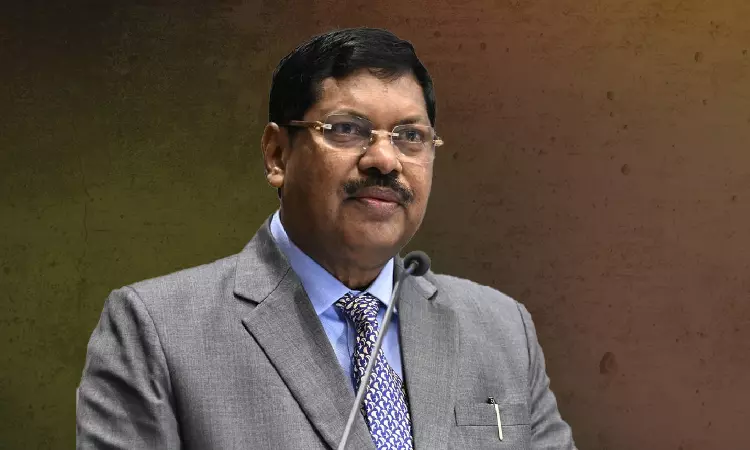- Home
- /
- Top Stories
- /
- Don't Go For Foreign LLM With 50-60...
Don't Go For Foreign LLM With 50-60 Lakhs Loan; Go Only With Scholarship : CJI BR Gavai To Law Students
Amisha Shrivastava
12 July 2025 5:44 PM IST
“A foreign degree alone is not a stamp of your worth.”
Chief Justice of India Justice B.R. Gavai, addressing the 22nd Convocation of NALSAR University of Law, Hyderabad, spoke at length about the pressures faced by young legal professionals, especially the growing trend of pursuing foreign degrees under financial and social duress. He cautioned graduating students against going abroad solely under peer pressure or as a symbol...
Chief Justice of India Justice B.R. Gavai, addressing the 22nd Convocation of NALSAR University of Law, Hyderabad, spoke at length about the pressures faced by young legal professionals, especially the growing trend of pursuing foreign degrees under financial and social duress. He cautioned graduating students against going abroad solely under peer pressure or as a symbol of validation.
“If you wish to go, go. It broadens your horizons. It teaches you how the world thinks. But please, go with scholarship and funding. Go with purpose. Not pressure,” he said.
Referring to loans taken for foreign education, he observed, “Do not put yourself or your family under the burden of loans amounting to 50–70 lakhs just for a foreign degree. A foreign degree alone is not a stamp of your worth.”
He suggested that such amounts could instead be used as an investment to start an independent practice or build a chamber. “And later, when you are stable, go abroad for studies. There is no age bar to learn. Go abroad not to escape, but to expand,” he said.
Justice Gavai also linked the trend of going abroad to the state of legal education in India. “This growing trend of going abroad also reflects a structural issue: it signals a lack of confidence in the state of post-graduate legal education and research in our own country,” he said.
Justice Gavai pointed out the lack of structured post-doctoral research opportunities, limited funding for early-career scholars, and opaque hiring processes. “Furthermore, it is not that talent does not want to return. Many who study abroad come back with renewed passion and fresh perspectives. But when they return, they often find our institutions unwelcoming, under-resourced, or closed to new ideas. There are few structured pathways for post-doctoral research, limited funding for early career scholars, and opaque hiring processes that discourage even the most committed.,” he said. “This must change.”
He urged systemic improvements to retain and attract talent, including nurturing academic environments, transparent opportunities, and restoring dignity and purpose to legal research and teaching in India.
Speaking to the graduates, he acknowledged the challenges of the legal profession, calling it noble but demanding, and spoke about the importance of self-belief and presence.
“The legal profession is many things. It is noble. It is important. But, it is never easy. Never. There is no straight path to the profession. There are no guaranteed returns. This profession demands that you constantly prove yourself: to the court, to your client, to your peers, and often, to yourself. It demands. And it keeps demanding.”
He quoted Thomas Grant's biography of Sydney Kentridge to describe the demanding nature of advocacy, and emphasised the need to stay grounded in core subjects like constitutional law, contract, civil and criminal procedure.
He underlined the role of mentorship in a young lawyer's life, stating, “I am here today not just because I worked hard. Yes, effort mattered. But so did the fact that someone opened a door for me. Someone saw something in me before I could see it in myself.”
He discussed structural inequalities in the legal profession, the stigma around mental health, and the emotional toll of the profession.
“Let me speak now of something we rarely speak of in such grand ceremonies: mental health. This profession can be isolating and emotionally taxing. The hours are long. The expectations, high. The culture, sometimes ruthless. You will feel pressure not just to succeed, but to appear successful. Many hide their struggles. I urge you not to. Find your community”, Justice Gavai said.
He added, “Structural inequality hides in silence. In the subtle comments. In the internship that never comes. In the doors that are hard to open… A student from a National Law School in a metro city may be seen as “better placed” than one from a smaller university, not necessarily because of skill, but because of perception. This is unfair. But it is real. We need to confront it, not accept it.”
He encouraged the graduates to prioritise community, care, and imagination, and to seek mentors who value integrity. He concluded his address with advice on remembering five aspects of life: friends and family, books, hobbies, health, and imagination.



